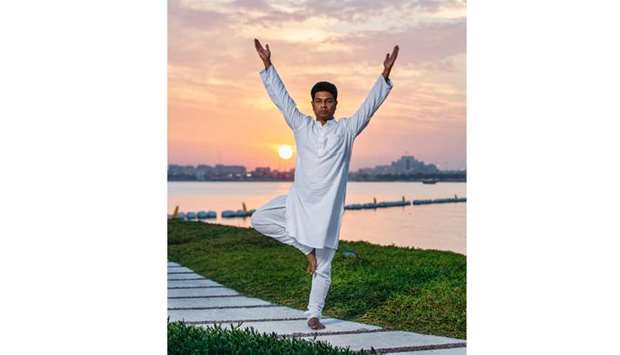* Award winning guru Vishnu Prasad stress the point that yoga is helpful in fight against Covid-19
The world recently marked International Yoga Day with the theme of ‘yoga for well-being’ focusing on both its physical and mental health benefits during the ongoing Covid-19 pandemic.
Beyond its immediate impact on physical health, the pandemic has also exacerbated psychological sufferings and mental health problems, including depression and anxiety, as pandemic-related restrictions continue in various forms in many countries.
Award winning Vishnu Prasad is regarded as one of the leading and young well-being consultants from India in Qatar. He is the founder of ‘Swasthi Yoga Studio Doha’. Author of two books – ‘Silence to Stillness’ and ‘No One can Hurt You,’ Vishnu has served thousands of people from more than 75 nationalities.
On the eve of the yoga day, Gulf Times spoke to Vishnu on how yoga can be helpful in dealing with both physical and mental health issues during the pandemic. The holder of the title ‘Yoga Shiromani’ has been trying to serve the traditional style of yoga – Hatha Yoga. He has been in Doha for eight years and been offering couching classes at Sheraton hotel Doha and Qatar Foundation.
For Vishnu, the UN message of yoga for wellness is very meaningful during the pandemic. “It is wrong to think that yoga is only for flexibility or it does not build muscles. Yoga is not about touching our toes. It is about touching our mind, body and soul with wellness. Wellness is nothing but the absence of illness. Yoga synchronises body, mind and soul to live with ease. It promotes wellness of a person by improving the efficacy of different systems of the human body.”
Vishnu, who started offering monthly out door full moon yoga events in Doha, underlines what psychological impact the pandemic has on people and how it affects physically. “Covid-19 has not only been affecting the physical but also the mental and emotional health of people. With unclear and uncertain future, the pandemic has become a major source for uncontrollable stress besides anxiety, fear, sleep deprivation, financial strain, illness, over work and relationship discord.”
The continuous stress definitely leads to biological impact on the body. It activates the sympathetic nervous system, also known as the body’s fight or flight response to stress. “When the fight or flight response is continuously activated, it increases stress hormones cortisol levels and can start to have more negative effects on our immune system. Elevated cortisol suppresses our immune system by reducing production of white blood cells. Without white blood cells on the hunt for germs, our response to an infection is much slower. So, long periods of cortisol elevation can leave us susceptible to illnesses.”
Speaking about how yoga can be helpful during these uncertain times, the instructor said: “In one study, researchers found people who meditated every day developed more antibodies to a flu virus than those who didn’t. So, spend a few minutes every day disconnecting from the busy world and especially turn to meditation when you feel anxiety or stressed.
“Yoga and meditation can help calm down our physiological symptoms in a way that promotes mental health. Yoga activates the parasympathetic nervous system, which stimulates muscles to become less tense and lowers the heart rate and blood pressure. Meditation and breathing techniques can calm down the nervous system. Breathing techniques also help to eliminate the toxins and unpleasant emotions because our breath is the link between body and mind. People who can’t directly enter the meditation, it will be very useful for them to do the breathing techniques.”
When asked how individuals can practice yoga at home or in quarantine, the expert said that the time is perfect to do some yoga as people do not have to go anywhere and they do not need special equipment. “People, who live alone without their loved one or friends, experience loneliness more than others during the pandemic or during quarantine. There is no emotional support system for them. They have to connect and find the ways to use time for something productive or to connect through online with community and new friends and share their issues. They can also ask for online counseling before slipping to deep depression. In the absence of physical group seasons, people can do a self-practice by watching video online. If you need a personal assistance, you can also join any online classes. Further, we need to find time for meditation, eat in time, get enough sleep, drink enough water and add green veggies to diet.”

